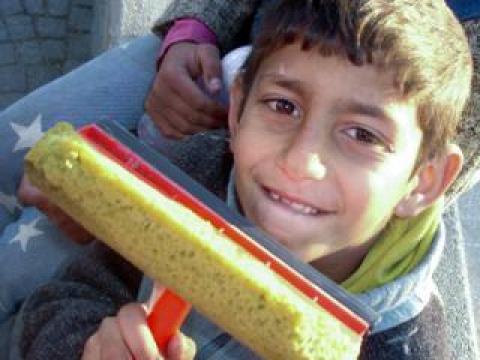Why Albania falls short on World Day of Social Justice

‘All humans are born free and equal in dignity and rights; all have the right to life and liberty’, states the Declaration of Human Rights, yet the streets of Albania’s major cities are home to children that are abused and exploited for work under the harshest of conditions.
Other kids call me ‘leprous’ and they swear at me because I don’t go to school, but I cannot afford to buy clothes to go to school A World Vision Albania Quantitative study interviewed some 293 street working children in 2008. The study revealed as many as half of the children start work before the age of 10, with the average working hours between seven to 18 hours per day.
In addition to taking them out of school and denying them a childhood, work on the street strips children of their dignity and freedom.
“Other kids call me ‘leprous’ and they swear at me because I don’t go to school, but I cannot afford to buy clothes to go to school,” said a 12-year-old boy who was working on the street when interviewed by a World Vision staff member.
Child labour however, is not only a street phenomenon. Thousands of other children work in the private sector either in agriculture, construction or the fishing industry. The Albanian National Labour Inspectorate says that child labour is prevalent in Albania and records some 133,000 children who work in the private sector*.
“I work in construction with my dad. I started to help him when I was in sixth grade,” says a 13-year-old boy from Barbulloj i Ri village in Lezha, Northern Albania.
In Northern Albania, thousands of other children are denied their freedom due to blood feuds, which ‘imprison’ people in their homes. . Some 1,200 children were reported to be imprisoned at home in a Human Development Promotion Center Situation Report in 2009.
The fourth article of the Declaration of Human Rights states, “No one shall be held in slavery or servitude; slavery and the slave trade shall be prohibited in all their forms.”
Trafficking, the most common form of modern day slavery is also rife in Albania, which has emerged as a major source and transit country for women and girls, says UNICEF and the Organisation for Security and Cooperation in Europe. Trafficked Albanian girls are typically younger than in other countries with 80% of them under 18 and mostly from rural areas.
Trafficking in Albania goes beyond prostitution, with many children trafficked internally and externally for forced labour.
‘No one shall be subjected to torture or to cruel, inhuman or degrading treatment or punishment,’ says the Declaration, yet child abuse in the home and school is also widespread.
According to UNICEF, 1 in 2 Albanian children experience physical violence at home and 1 in 3 at school. UNICEF also reports that 13.3% of children attending school experience sexual abuse.
In the last 18 years Albania has undergone much positive change, however, much remains to be done to overcome social and physical poverty.
Trafficking in Albania goes beyond prostitution, with many children trafficked internally and externally for forced labour “There are thousands of children in Albania who live in extreme poverty, suffer social exclusion, who lack protection and hope,” said Enkelejda Lopari, World Vision Albania Operations Director and President of the BKTF coalition –a national network of some 20 local and international NGOs.
During its 10 years of operations in the country, World Vision has focused on addressing the immediate needs of the most vulnerable and alleviating the root causes of poverty. World Vision works both at the grassroots and national level engaging all actors to fight against injustice and advocate for the wellbeing of the poor. As part of BKTF, World Vision is lobbying with the government to more intentionally address issues of child rights and protection in the country.
“There is still a lot to do in Albania starting with the establishment of good policies and practices at the local and national level to address issues of children living in the street, child victims of blood feuds, children with special needs and those who live in extreme poverty. Individual responsibility and the awakening of the civil society in Albania on such issues are also very important. It is the responsibility of us, as adults to make sure that children receive guidance about how to live and get concerned with social justice issues,” concluded Mrs. Lopari.
-Ends-
*Human Development Promotion Center (HDPC), Albania Situation Report 2009.